Politics
MPs have declared more than £6m in ‘freebies’ since 2010, analysis shows | Politics
MPs have declared more than £6m in “freebies” since 2010 with the cash price of gifts given almost tripling over two years, analysis reveals, leading to calls for urgent reform.
The value of “gifts, benefits and hospitality” declared by MPs was £1.3m in 2023, analysis shows, up from £483,507 in 2021. And the amount of gifts increased to 768 from 337 during the same period.
But the sum total of gifts will be even higher because the figures do not include those received by ministers, who are not required to declare them on the register of MPs’ interests. Nor does it factor in interest-free seven-figure loans made to parliamentarians.
Figures show that almost half of all the donations accepted by MPs since 2010 were given in the last two years. They included tickets for football matches and concerts, badges for horse race meetings, honorary club memberships, helicopter rides and payment of legal fees.
The MP who had declared the most gifts and hospitality items since 2010 was Laurence Robertson, the former Tory MP for Tewkesbury, who lost his seat at the last election. He accepted 88 gifts worth £81,913.53. Forty-nine of those came from betting companies, with a further 32 coming from horse racing companies. The Guardian approached him for comment.
There is continuing controversy around Keir Starmer and the “passes for glasses” scandal. The prime minister, who has declared more free tickets and gifts than other party leaders in recent times, initially failed to declare designer clothes and spectacles given to him and his wife by the Labour peer Waheed Alli.
The data has prompted calls for a swift reform of the rules, including strengthening the requirements surrounding ministers’ gifts and requesting more information from MPs declaring larger amounts.
Senior government figures believe there is a discrepancy between the rules which apply to ministers and those relating to MPs and are examining potential changes.
At present, ministers make transparency declarations through their departments. They do not have to cite a value for the hospitality they receive and what they do declare is often infrequent, delayed and patchy.
Any reforms would be made through the modernisation committee, which was established earlier this month and is chaired by the Commons leader, Lucy Powell.
Tim Durrant, programme director at the Institute for Government, said the controversy over Starmer’s declarations highlighted “inconsistencies in the system that should be rectified and public concerns about gifts to politicians that warrant further reform”.
“It doesn’t make sense that ministers do not have to declare gifts and hospitality as quickly and in as much detail as non-governmental MPs. Labour criticised this in opposition and should close this loophole for ministers as soon as possible,” Durrant said.
Alistair Graham, a former chair of the committee on standards in public life, suggested that MPs should be asked to give more detail about larger gifts and said the rules around transparency should be the same for MPs and ministers.
“I don’t think if somebody is given a ticket for a football match it’s likely to influence their policymaking decisions,” Graham said. “The scale of the freebie I think is important. The larger amount, the more likely the organisation or individual is going to seek some benefit from it. We perhaps need a threshold above which more detail is given.”
Rob Ford, a professor of politics at the University of Manchester, said that from the public’s perspective the issue would be those who are perceived to be abusing the system.
“A lot of people might have done a corporate hospitality jolly at a football match. But if you’ve got someone doing it 20 times a year, they’ll think that seems a bit dodgy,” he said.
Experts underlined that the declarations system offered transparency and enabled scrutiny of MPs’ gifts and hospitality.
Since the row over Lord Alli’s donations, the Labour top team has pledged to stop taking clothes as gifts. Analysis found clothes made up a tiny proportion of gifts, with free hospitality making up a much bigger proportion of declarations.
Taking into account the relative size of the parliamentary parties, Conservative MPs declared more gifts on average than Labour MPs between 2010 and 2022, at which point Labour MPs started receiving more than their Tory colleagues.
Gifts to Conservative MPs were also worth more on average over the same period – £1,372 per item in 2023, compared with £867 for each gift to a Labour MP.
after newsletter promotion
After Robertson, the former MP who declared the most gifts and hospitality items was the former Commons speaker John Bercow (82 gifts – 32 of them tickets to tennis matches including Wimbledon). He was followed by Theresa May (79 gifts – mostly for the VIP suite in Heathrow, which former prime ministers make use of).
A Heathrow spokesperson said: “We always take a view on how to maintain a safe and efficient operation at the airport. At our discretion, we have the option of providing limited access to the Windsor suite where we consider it will make the best use of the airport’s security resources. As the register reflects, the proper reporting procedures have been followed.”
Philip Davies, who set up a consultancy firm as election defeat loomed, accepted 77 gifts after 2010, 55 of which were from betting or horse racing firms.
The gifts, hospitality and benefits which MPs accepted came from a variety of donors, but certain industries and businesses including airports, gambling companies, sports and members’ clubs, broadcasters and other music and entertainment industry companies featured heavily.
The Guardian identified 156 MPs who accepted 393 tickets or other freebies from football clubs and leaguesafter 2015 with a combined face value of more than £284,000.
Over the same time period at least 84 MPs accepted more than £270,000 in gifts from bookmakers or other gambling bodies, which were also often tickets to football matches or other sporting events.
Broadcasters have given 113 different MPs hospitality freebies worth a combined £200,000. These were again mainly tickets to sports matches or cultural events such as the Baftas or National Television Awards.
Meanwhile record labels, festivals and music industry associations have provided at least 92 MPs with more than £192,000 in gifts since 2015, including tickets to award shows, festivals and gigs by Kylie, Adele, the Cure, and the Rolling Stones.
The top 10 gift-givers since 2015
Heathrow Airport – 119 Show The Guardian compiled versions of the Register of Members’ Financial Interests stretching back to 2010, using the Parliament API and historical digitised editions from MySociety. The following categories were looked at: Gifts, benefits and hospitality (UK), Overseas benefits and gifts (from 2010 to 2015), Gifts, benefits and hospitality from UK sources and Gifts and benefits from sources outside the UK (from 2015 onwards). Only items with a notional monetary value attached were included in the analysis. Duplicate items on the register (when the same item had been declared using different wording on two different editions) were removed. When a gift was declared with a currency estimate between two values the mid-point was used, unless the range given was for a membership pass or multi-event ticket in which case the higher figure was used. When a gift was itemised the total value was used and counted as one gift. The Guardian manually categorised the donors as to their industry (e.g. Betting and Gambling, Horseracing, Football, Music, or Aviation).
Premier League – 105
Betting and Gaming Council – 93
Lawn Tennis Association – 63
UK Music – 62
Jockey Club Racecourses – 60
ITV – 58
FA group – 57
BBC – 55
Unite the Union – 52
Q&A
How we analysed 14 years of gifts
Politics
Education secretary ‘open minded’ on England smacking ban

 Getty Images
Getty ImagesThe education secretary has said she is “open minded” to a ban on smacking children in England, but that there are no imminent plans to change the law.
It comes after fresh calls for a ban in England by Children’s Commissioner Dame Rachel de Souza, who suggested adopting similar measures already in place in Scotland and Wales.
Asked if she supports that proposal, Bridget Phillipson told the BBC’s Laura Kuenssberg that the government is “considering it” but legislation would not be brought forward “any time soon”.
Children’s charity the NSPCC called on new legislation “as soon as possible” as there was “mounting evidence” that physically disciplining children could be “damaging”.
Speaking on Sunday morning, Phillipson said she was keen to hear from Dame Rachel and other experts “on how [a ban] would work”.
She added that she thought “we do need to look at how we keep children safe”.
Phillipson added that the upcoming Children’s Wellbeing Bill, which is expected to be introduced “by the end of the year”, will address many of the issues relating to children’s care and safeguarding.
Anna Edmundson, head of policy at the NSPCC, told the BBC that calls had tripled to the charity’s helpline from adults concerned about the use of physical punishment on children.
In a statement she added: “That is why we want the Government to legislate as soon as possible to give children in England the same protection from assault afforded to adults and already in place for children in Scotland and Wales.”
Other charities, including Barnardo’s, have also long called for an English smacking ban and two-thirds of English people polled by YouGov in March last year said physically disciplining a child is not acceptable.
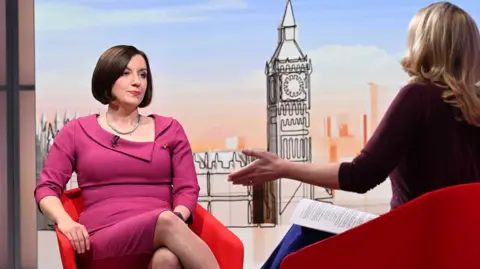
In England and Northern Ireland it is legal for a carer or parent to discipline their child physically if it is a “reasonable” punishment – but the Children Act 2004 made it illegal to assault a child causing actual or grievous bodily harm.
The previous Conservative government argued parents should be trusted to discipline their children and there were “clear laws in place” to prevent violence.
The Department for Education told the BBC earlier this week that it was now “looking closely” at the law changes made in Scotland and Wales, which came into force in 2020 and 2022 respectively, to see whether more could be done in England.
Posting on X last week, Dame Rachel said a ban on any kind of corporal punishment, including smacking, hitting, slapping and shaking, could stop lower level violence from escalating.
“If we are serious about keeping every child safe, it’s time England takes this necessary step,” she said.
“Too many children have been harmed or killed at the hands of the people who should love and care for them most.”
Politics
Chancellor expected to hike employers National Insurance
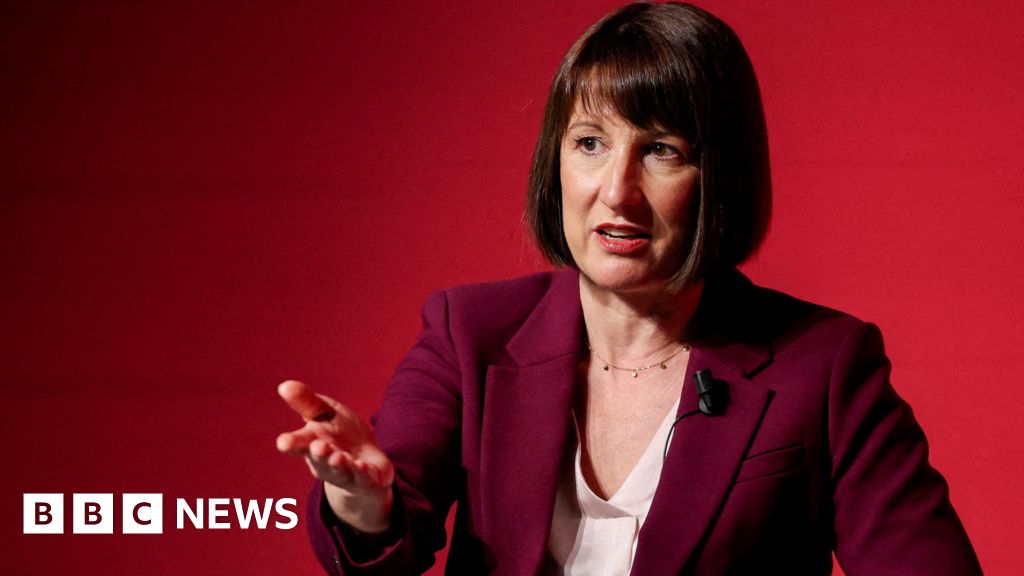
The chancellor is set to increase the amount employers in the UK pay in National Insurance at the Budget.
Rachel Reeves is also expected to lower the threshold for when employers start paying the tax, but is not likely to introduce the levy to employer pensions contributions.
It is understood the changes could raise £20bn for public services, such as the NHS.
The move is thought to be the single largest revenue raiser of next week’s Budget, but other tax rises are also expected.
Politics
Labour MPs urge Keir Starmer to clarify stance on non-cash slavery reparations | Commonwealth summit
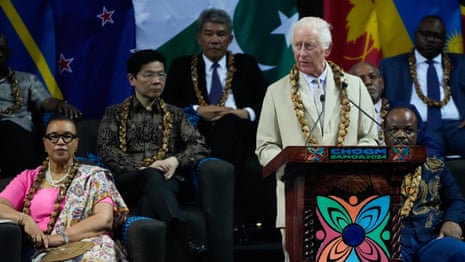
Labour MPs have urged Keir Starmer to clarify his government’s position on non-cash reparations for Britain’s historical role in the slave trade, as No 10 says the issue is off the table.
In the run-up to the Commonwealth heads of government meeting (Chogm), the government said it would not be issuing an official state apology.
While travelling to the conference, which began in the Pacific island nation of Samoa on Friday, the prime minister told reporters he wanted to “look forward” rather than have “very long endless discussions about reparations on the past”.
King Charles acknowledged “painful aspects” of Britain’s past but sidestepped calls to directly address reparations for slavery, saying “none of us can change the past, but we can commit … to learning its lessons”.
But despite the insistence from Downing Street that the issue was not on the agenda for the summit of 56 Commonwealth countries, leaders were prepared to defy the UK. A draft version of the final communique that was leaked to the BBC this week said leaders had “agreed that the time has come for a meaningful, truthful and respectful conversation towards forging a common future based on equity”.
After mounting pressure for the UK to engage in a “meaningful, truthful and respectful” conversation about Britain’s past, a source in No 10 said the UK could support some forms of reparatory justice, such as restructuring financial institutions and providing debt relief.
This was initially welcomed by the Labour MP Diane Abbott, who sits on the all-party parliamentary group for Afrikan reparations (APPG-AR), who said she was “glad that Starmer seems to have backed off from his complete hostility to the concept of reparations. It remains to be seen what he means by ‘non-financial reparative justice’.”
Some campaigners were frustrated by what they felt to be either a game of semantics on the issue, or a deliberate misrepresentation of what the campaign for reparations is. Among the long-established 10-point plan for reparatory justice by the Caribbean community (Caricom) is debt cancellation, while others have long campaigned on the link between reparatory justice and climate resilience.
Michael McEachrane, the UN rapporteur of the permanent forum on people of African descent, said: “Keir Starmer misrepresents reparations … It is a matter of taking responsibility for and transforming legacies of the past in the present.”
Only then, McEachrane added, would the Commonwealth community see “greater equity within and among countries”.
When No 10 was pressed to explain what it meant by non-financial reparative justice in Friday’s press briefing, a spokesperson pushed back on the idea.
The prime minister’s deputy spokesperson said: “Our position on reparations is clear, and that goes for other forms of non-financial reparatory justice too. The prime minister’s focus is on addressing the challenges that we face.”
In response, Abbott said: “Incredible that Starmer wants to treat the leaders of fellow Commonwealth countries with such disrespect. And it is offensive that he seems to be saying that he knows what they want to discuss better than they themselves do.”
Fellow Labour MP Clive Lewis questioned how Starmer and his team could go to the summit and not expect reparations to come up: “Has he not been paying attention to the African Union, Caricom, [the Barbados PM] Mia Mottley, the Bridgetown Initiative? This is what has been happening whilst he has been in politics.
“It looks very much like they’ve said, in a very kind of colonial mindset, that this is not for discussion. It’s not on the agenda. Well, that’s not going to go down well in a Commonwealth of equals.”
Lewis, who called in parliament for the UK to enter negotiations with Caribbean leaders on paying reparations for Britain’s role in slavery, said: “You have to ask the question, given that David Lammy himself is a son of Guyana, who has been talking about this for years, the person who came after Bernie Grant: someone lost a memo somewhere.
“I can’t believe that David didn’t know that this was going to come up, and someone must have told No 10 this was coming up … it is quite revealing of something.”
Politics
Some Home Office staff to get pay rise of over 9%
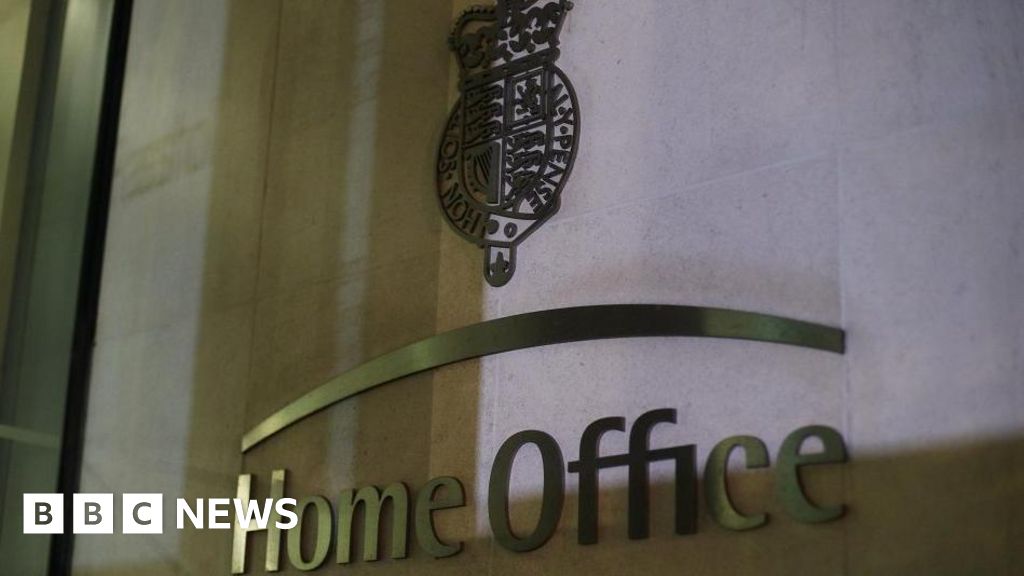
Some Home Office staff are getting an inflation-busting 9% pay rise, the department has confirmed.
The union representing civil servants, PCS, welcomed the deal, which is nearly double the 5% agreed for most civil servants.
The pay boost is meant to improve staff retention and morale, which is the lowest in the civil service.
But Conservative MP Neil O’Brien said the pay hike would “stick in the craw” of people worried about immigration and crime.
The BBC understands the pay rises will be backdated to the start of July and will range from 6% to 9.1% for executive officers working outside of London.
Inflation is running at 2.2%, according to the latest figures.
But the PCS union said its members “deserve rises significantly above inflation to reclaim pay that we have lost through years of below-inflation rises”.
The Home Office’s most recent annual report showed the cost of hiring temporary agency staff had tripled on the last two years to more than half a billion pounds, most of which was spent on dealing with illegal immigration, as well as the now-cancelled Rwanda deal.
A Home Office spokesman said the pay rises were in line with the civil service pay remit guidance.
He said: “This year’s pay guidance recognises the hard work and vital importance of all our staff and is broadly in line with others in the public sector.
“One relatively junior grade in a particular region has received the higher amount to bring them into line with their peers.”
PCS general secretary Fran Heathcote said she would continue to push for a “fair and sustainable long-term pay settlement” to make up for “many years” of below-inflation pay.
She said: “We have made progress in negotiations with the Home Office and we welcome the fact that the final offer would deliver increases for the admin and executive grades that are above the 5% headline figure in the civil service remit.
“We believe this is the best award that can be delivered through departmental negotiations alone.”
However, critics have questioned whether the recent performance of the Home Office staff justified a bumper pay rise.
The move comes as the number of migrants who have crossed the Channel in small boats so far this year topped 29,000, approached the total for the whole of last year.
O’Brien said: “I have no problem with people being rewarded for good performance.
“But with massive numbers crossing the channel, crime clear-up rates low and dangerous people getting let out of jail, this large pay rise will stick in the craw of a lot of people.”
Politics
Couple given go-ahead to sue governments over winter fuel payment
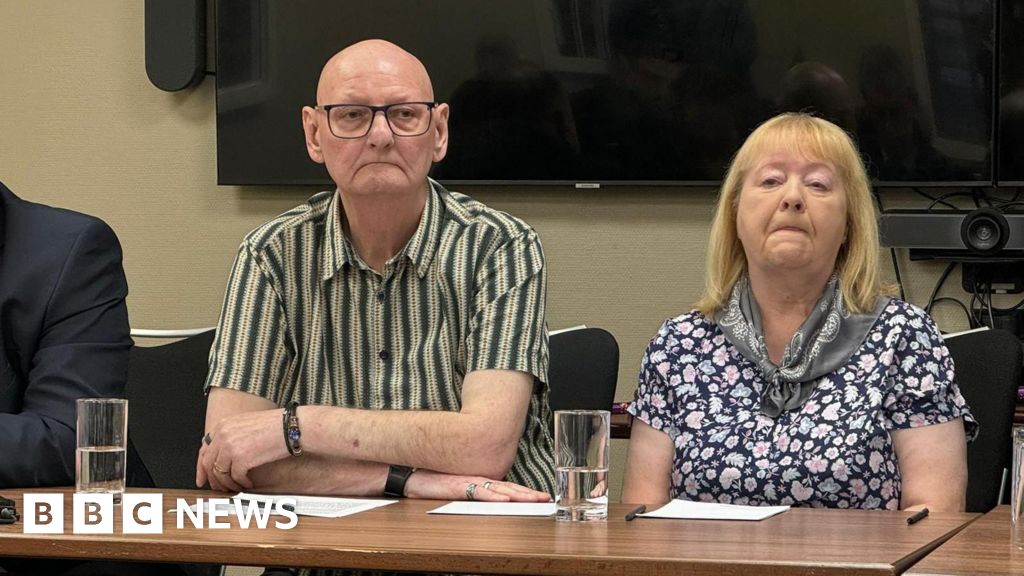
A Scottish couple have been given permission to proceed with a legal bid to overturn the scrapping of the universal winter fuel benefit for all pensioners.
Peter and Florence Fanning, from Coatbridge in North Lanarkshire, have argued both the UK and Scottish governments failed to adequately consult with those of pension age and did not release an equality impact assessment on the changes.
The judicial review required a judge’s approval to move to a full hearing, which has been given.
A hearing at the Court of Session in Edinburgh is now scheduled for 15 January.
The case will ask the Court of Session to rule on whether the decision to scrap the universal benefit was unlawful.
This would allow the petitioners to ask the court to, in effect, set aside the policy and restore the winter fuel payment to all.
A spokesperson for Govan Law Centre, which has taken the case for the Fannings, said their clients were “delighted” that permission had been granted.
They added they were awaiting a decision next week on whether civil legal aid from the Scottish Legal Aid Board would be granted.
The controversial decision has been criticised by trade unions and groups representing older people.
Chancellor Rachel Reeves previously announced the benefit needed to be means- tested from this winter due to a £22m “black hole” in public finances that she said Labour had inherited from the previous Conservative government.
The benefit is devolved but the Scottish government said it had to follow suit as £160m had been taken out its budget.
Mr Fanning stated in September that the decision created “manifest injustice” for those affected.
The couple were being supported by former Scottish first minister Alex Salmond, who put them in touch with Govan Law Centre and called the payment being scrapped “unacceptable”.
The Alba party leader has since died after suffering a heart attack in North Macedonia.
First Minister John Swinney said last month that he understood public concerns about the payment but that the Scottish government was having to face “hard reality” regarding budgets.
Earlier this month the SNP tabled a Holyrood motion calling on Sir Keir Starmer to reverse the decision.
A spokesperson for the UK government previously said it was committed to supporting pensioners and that millions would see their state pension rise by £1,700 during this parliament.
Politics
Many African kings opposed eradicating slavery
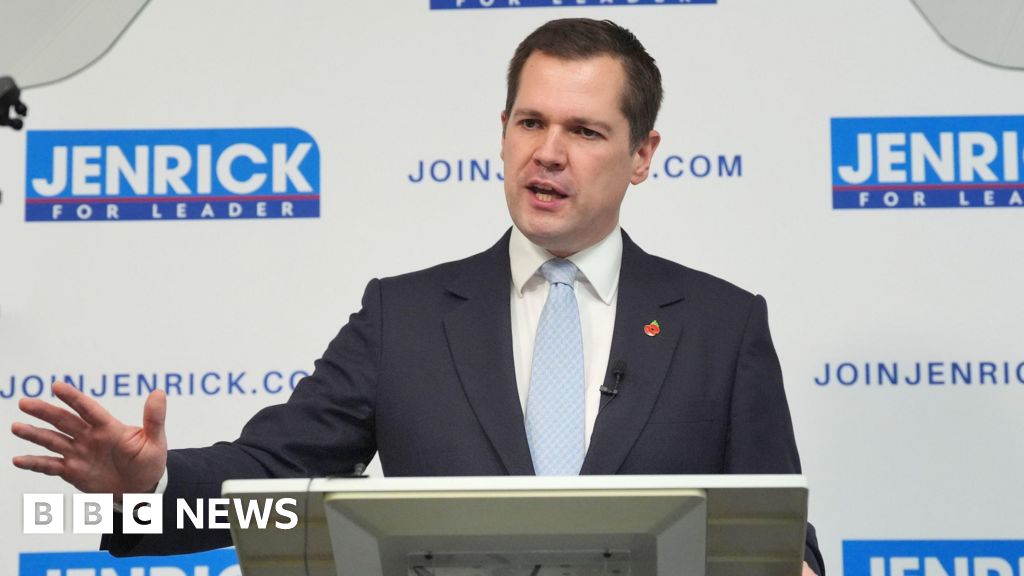
The government should “unequivocally reject” calls for the UK to pay reparations for its role in the slave trade, Tory leadership candidate Robert Jenrick has said.
He said calls for the UK to pay reparations were “based on false and misleading narratives about our past”.
Britain “worked harder than nearly any other country to eradicate the practice” in the 19th century, adding that the campaign against slavery was “opposed by many African kings”.
There have been attempts to get reparations discussed at a meeting of the 56 Commonwealth countries in Samoa.
Chancellor Rachel Reeves has already ruled out making payments, telling the BBC: “That’s not something that this government is doing.”
Prime Minister Sir Keir Starmer said the slave trade was “abhorrent” but that it would be better to focus on “today’s challenges” such as climate change.
Caribbean countries have been particularly keen to press the issue. Earlier this week, Bahamas foreign minister Frederick Mitchell told BBC Radio 4’s Today programme that reparations were not just about money but a matter of “respect, acknowledging the past was wrong and needs to be corrected”.
Kemi Badenoch, Jenrick’s opponent in the Tory leadership race, said the government was facing reparation demands because Labour politicians had “spent their time in opposition supporting these sort of fringe, unnecessary causes under the guise of decolonisation”.
“Now the British public are waking up to the reality of a Labour government that is ashamed of its own country – giving away the Chagos Islands, watering down Britain’s influence at the UN, and reducing our support for Israel in their fight against terror.
“If I am leader of the opposition I will ensure Keir Starmer is held to account for his deplorable actions.”
Reparations are actions that can be taken to amend for past wrongs. For example, in 2013, the UK government paid £19.9m to 5,000 elderly Kenyans who had been tortured by British colonial forces in the 1950s.
From the 16th century, the British government, along with other European countries, participated in the transatlantic slave trade.
It is estimated that between 1500 and 1800 around 12 -15 million people were trafficked from African countries to be used as enslaved labour in the Caribbean, North, Central and South America. Around two million died on the journey to the Americas.
Having been one of the big beneficiaries of the trade, Britain had a key role in ending the practice and abolished slavery in 1833.
As part of the policy, British plantation owners were paid £20m for the loss of their slaves, creating a debt the UK only finished paying off in 2015.
Addressing the Henry Jackson Society think tank in London, Jenrick said: “It was Britain that spent 1.8% of GDP between 1808 and 1867 on eradicating slavery – the most expensive moral foreign policy on human history.”
“It was a campaign in fact opposed by many African Kings.
“The West African squadron sacrificed their lives for liberty and freedom and it is high time that we recognise their contribution with a national memorial to honour them and everything that they did.”
The Royal Navy squadron was tasked with stopping vessels transporting slaves and was involved in freeing around 150,000 slaves in the 19th century.
Just as European nations were enriched themselves through the slave trade, some African slave sellers also profited from the practice.
Jenrick said calls for the UK to pay reparations were “based on false and misleading narratives about our past”.
Last year, a UN judge co-authored a report which estimated that the UK should pay £18.8tn for its involvement in slavery.
The report said the harm caused by the slave trade was “vast” adding: “Its repercussions resonate in the lives of descendants of the enslaved to this day.”
It also argues that descendants “even to this day” have lower incomes and poor health outcomes.
Historian Professor Sir Hilary Beckles told the report that slavery had led to the black population in the Caribbean experiencing high levels of diabetes, with Barbados and Jamaica “competing for the title of ‘Amputation Capital of the World.’”.
-

 Technology1 month ago
Technology1 month agoIs sharing your smartphone PIN part of a healthy relationship?
-

 Science & Environment1 month ago
Science & Environment1 month agoHow to unsnarl a tangle of threads, according to physics
-

 Science & Environment1 month ago
Science & Environment1 month agoHyperelastic gel is one of the stretchiest materials known to science
-

 Science & Environment1 month ago
Science & Environment1 month ago‘Running of the bulls’ festival crowds move like charged particles
-

 Science & Environment1 month ago
Science & Environment1 month agoMaxwell’s demon charges quantum batteries inside of a quantum computer
-

 Technology1 month ago
Technology1 month agoWould-be reality TV contestants ‘not looking real’
-

 Science & Environment1 month ago
Science & Environment1 month agoX-rays reveal half-billion-year-old insect ancestor
-

 Science & Environment1 month ago
Science & Environment1 month agoSunlight-trapping device can generate temperatures over 1000°C
-

 Technology4 weeks ago
Technology4 weeks agoUkraine is using AI to manage the removal of Russian landmines
-

 Science & Environment1 month ago
Science & Environment1 month agoLiquid crystals could improve quantum communication devices
-

 Science & Environment1 month ago
Science & Environment1 month agoQuantum ‘supersolid’ matter stirred using magnets
-

 Science & Environment1 month ago
Science & Environment1 month agoLaser helps turn an electron into a coil of mass and charge
-

 TV3 weeks ago
TV3 weeks agoসারাদেশে দিনব্যাপী বৃষ্টির পূর্বাভাস; সমুদ্রবন্দরে ৩ নম্বর সংকেত | Weather Today | Jamuna TV
-

 Sport3 weeks ago
Sport3 weeks agoBoxing: World champion Nick Ball set for Liverpool homecoming against Ronny Rios
-

 Technology3 weeks ago
Technology3 weeks agoSamsung Passkeys will work with Samsung’s smart home devices
-

 News3 weeks ago
News3 weeks agoMassive blasts in Beirut after renewed Israeli air strikes
-

 Science & Environment1 month ago
Science & Environment1 month agoPhysicists have worked out how to melt any material
-

 Science & Environment1 month ago
Science & Environment1 month agoA new kind of experiment at the Large Hadron Collider could unravel quantum reality
-

 Football4 weeks ago
Football4 weeks agoRangers & Celtic ready for first SWPL derby showdown
-

 News3 weeks ago
News3 weeks agoNavigating the News Void: Opportunities for Revitalization
-

 News3 weeks ago
News3 weeks ago‘Blacks for Trump’ and Pennsylvania progressives play for undecided voters
-

 News3 weeks ago
News3 weeks ago▶ Hamas Spent $1B on Tunnels Instead of Investing in a Future for Gaza’s People
-

 MMA3 weeks ago
MMA3 weeks ago‘Uncrowned queen’ Kayla Harrison tastes blood, wants UFC title run
-

 Womens Workouts1 month ago
Womens Workouts1 month ago3 Day Full Body Women’s Dumbbell Only Workout
-

 MMA4 weeks ago
MMA4 weeks agoDana White’s Contender Series 74 recap, analysis, winner grades
-

 Football3 weeks ago
Football3 weeks agoWhy does Prince William support Aston Villa?
-

 MMA3 weeks ago
MMA3 weeks agoPereira vs. Rountree prediction: Champ chases legend status
-

 Business3 weeks ago
Business3 weeks agoWhen to tip and when not to tip
-

 Sport3 weeks ago
Sport3 weeks agoAaron Ramsdale: Southampton goalkeeper left Arsenal for more game time
-

 Technology4 weeks ago
Technology4 weeks agoMicrophone made of atom-thick graphene could be used in smartphones
-

 Technology3 weeks ago
Technology3 weeks agoGmail gets redesigned summary cards with more data & features
-

 Sport3 weeks ago
Sport3 weeks agoWales fall to second loss of WXV against Italy
-

 Science & Environment1 month ago
Science & Environment1 month agoWhy this is a golden age for life to thrive across the universe
-

 Technology1 month ago
Technology1 month agoRussia is building ground-based kamikaze robots out of old hoverboards
-
Business4 weeks ago
DoJ accuses Donald Trump of ‘private criminal effort’ to overturn 2020 election
-

 Technology3 weeks ago
Technology3 weeks agoMusk faces SEC questions over X takeover
-

 Sport3 weeks ago
Sport3 weeks agoMan City ask for Premier League season to be DELAYED as Pep Guardiola escalates fixture pile-up row
-

 Technology4 weeks ago
Technology4 weeks agoEpic Games CEO Tim Sweeney renews blast at ‘gatekeeper’ platform owners
-

 News3 weeks ago
News3 weeks agoWoman who died of cancer ‘was misdiagnosed on phone call with GP’
-

 MMA3 weeks ago
MMA3 weeks agoKetlen Vieira vs. Kayla Harrison pick, start time, odds: UFC 307
-

 Science & Environment1 month ago
Science & Environment1 month agoQuantum forces used to automatically assemble tiny device
-

 Science & Environment1 month ago
Science & Environment1 month agoITER: Is the world’s biggest fusion experiment dead after new delay to 2035?
-

 Science & Environment1 month ago
Science & Environment1 month agoA slight curve helps rocks make the biggest splash
-

 News1 month ago
News1 month ago▶️ Hamas in the West Bank: Rising Support and Deadly Attacks You Might Not Know About
-

 Technology1 month ago
Technology1 month agoMeta has a major opportunity to win the AI hardware race
-

 Technology1 month ago
Technology1 month agoWhy Machines Learn: A clever primer makes sense of what makes AI possible
-

 Science & Environment1 month ago
Science & Environment1 month agoNerve fibres in the brain could generate quantum entanglement
-

 Science & Environment1 month ago
Science & Environment1 month agoNuclear fusion experiment overcomes two key operating hurdles
-

 Technology4 weeks ago
Technology4 weeks agoThis AI video generator can melt, crush, blow up, or turn anything into cake
-

 Technology3 weeks ago
Technology3 weeks agoMicrosoft just dropped Drasi, and it could change how we handle big data
-

 Sport4 weeks ago
Sport4 weeks agoSturm Graz: How Austrians ended Red Bull’s title dominance
-

 Money3 weeks ago
Money3 weeks agoWetherspoons issues update on closures – see the full list of five still at risk and 26 gone for good
-

 News3 weeks ago
News3 weeks agoFamily plans to honor hurricane victim using logs from fallen tree that killed him
-

 Sport3 weeks ago
Sport3 weeks ago2024 ICC Women’s T20 World Cup: Pakistan beat Sri Lanka
-

 Entertainment3 weeks ago
Entertainment3 weeks agoNew documentary explores actor Christopher Reeve’s life and legacy
-

 MMA4 weeks ago
MMA4 weeks agoJulianna Peña trashes Raquel Pennington’s behavior as champ
-
Business3 weeks ago
Sterling slides after Bailey says BoE could be ‘a bit more aggressive’ on rates
-

 Sport4 weeks ago
Sport4 weeks agoChina Open: Carlos Alcaraz recovers to beat Jannik Sinner in dramatic final
-

 MMA3 weeks ago
MMA3 weeks ago‘I was fighting on automatic pilot’ at UFC 306
-

 Business4 weeks ago
Business4 weeks agoChancellor Rachel Reeves says she needs to raise £20bn. How might she do it?
-
Business3 weeks ago
The search for Japan’s ‘lost’ art
-

 Technology3 weeks ago
Technology3 weeks agoThe best budget robot vacuums for 2024
-

 Sport3 weeks ago
Sport3 weeks agoCoco Gauff stages superb comeback to reach China Open final
-

 Science & Environment1 month ago
Science & Environment1 month agoTime travel sci-fi novel is a rip-roaringly good thought experiment
-

 Science & Environment1 month ago
Science & Environment1 month agoHow to wrap your mind around the real multiverse
-

 News1 month ago
News1 month ago▶️ Media Bias: How They Spin Attack on Hezbollah and Ignore the Reality
-

 Technology3 weeks ago
Technology3 weeks agoTexas is suing TikTok for allegedly violating its new child privacy law
-

 Technology3 weeks ago
Technology3 weeks agoIf you’ve ever considered smart glasses, this Amazon deal is for you
-
Business4 weeks ago
Bank of England warns of ‘future stress’ from hedge fund bets against US Treasuries
-

 News3 weeks ago
News3 weeks agoCornell is about to deport a student over Palestine activism
-

 News3 weeks ago
News3 weeks agoGerman Car Company Declares Bankruptcy – 200 Employees Lose Their Jobs
-

 MMA3 weeks ago
MMA3 weeks agoKayla Harrison gets involved in nasty war of words with Julianna Pena and Ketlen Vieira
-

 News3 weeks ago
News3 weeks agoHull KR 10-8 Warrington Wolves – Robins reach first Super League Grand Final
-

 MMA3 weeks ago
MMA3 weeks agoUFC 307 preview show: Will Alex Pereira’s wild ride continue, or does Khalil Rountree shock the world?
-
Business3 weeks ago
Head of UK Competition Appeal Tribunal to step down after rebuke for serious misconduct
-

 MMA3 weeks ago
MMA3 weeks agoPereira vs. Rountree preview show live stream
-

 Technology3 weeks ago
Technology3 weeks agoThe best shows on Max (formerly HBO Max) right now
-
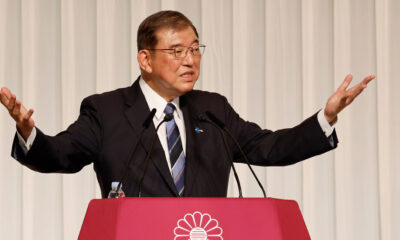
 Business4 weeks ago
Business4 weeks agoStocks Tumble in Japan After Party’s Election of New Prime Minister
-

 Sport4 weeks ago
Sport4 weeks agoWorld’s sexiest referee Claudia Romani shows off incredible figure in animal print bikini on South Beach
-

 Science & Environment4 weeks ago
Science & Environment4 weeks agoMarkets watch for dangers of further escalation
-

 Football4 weeks ago
Football4 weeks agoSimo Valakari: New St Johnstone boss says Scotland special in his heart
-

 Technology4 weeks ago
Technology4 weeks agoJ.B. Hunt and UP.Labs launch venture lab to build logistics startups
-

 Technology3 weeks ago
Technology3 weeks agoCheck, Remote, and Gusto discuss the future of work at Disrupt 2024
-

 Technology3 weeks ago
Technology3 weeks agoOpenAI secured more billions, but there’s still capital left for other startups
-

 Health & fitness3 weeks ago
Health & fitness3 weeks agoNHS surgeon who couldn’t find his scalpel cut patient’s chest open with the penknife he used to slice up his lunch
-

 Business3 weeks ago
Business3 weeks agoStark difference in UK and Ireland’s budgets
-

 News1 month ago
News1 month agoOur millionaire neighbour blocks us from using public footpath & screams at us in street.. it’s like living in a WARZONE – WordupNews
-

 News4 weeks ago
News4 weeks agoRwanda restricts funeral sizes following outbreak
-

 MMA4 weeks ago
MMA4 weeks agoAlex Pereira faces ‘trap game’ vs. Khalil Rountree
-
Politics3 weeks ago
Rosie Duffield’s savage departure raises difficult questions for Keir Starmer. He’d be foolish to ignore them | Gaby Hinsliff
-

 Money3 weeks ago
Money3 weeks agoPub selling Britain’s ‘CHEAPEST’ pints for just £2.60 – but you’ll have to follow super-strict rules to get in
-

 TV3 weeks ago
TV3 weeks agoLove Island star sparks feud rumours as one Islander is missing from glam girls’ night
-

 Technology3 weeks ago
Technology3 weeks agoApple iPhone 16 Plus vs Samsung Galaxy S24+
-

 News3 weeks ago
News3 weeks agoBalancing India and China Is the Challenge for Sri Lanka’s Dissanayake
-
News1 month ago
the pick of new debut fiction
-

 MMA4 weeks ago
MMA4 weeks agoHow to watch Salt Lake City title fights, lineup, odds, more
-
Business4 weeks ago
how UniCredit built its Commerzbank stake
-
Business4 weeks ago
Top shale boss says US ‘unusually vulnerable’ to Middle East oil shock
-

 News4 weeks ago
News4 weeks agoLiverpool secure win over Bologna on a night that shows this format might work
-

 TV4 weeks ago
TV4 weeks agoPhillip Schofield accidentally sets his camp on FIRE after using emergency radio to Channel 5 crew


You must be logged in to post a comment Login